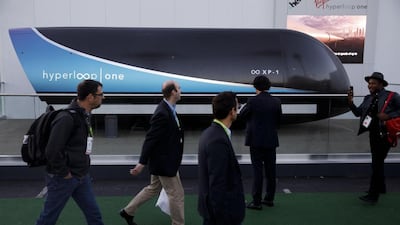One of the key players in the emerging hyperloop industry plans to showcase its offering at the US Pavilion at Expo 2020 in Dubai.
As the race to bring futuristic high speed travel to the world heats up, Virgin Hyperloop One has announced plans to unveil a "simulator" to mimic how it will feel to travel at the speed of sound when the company’s version of the technology is in commercial use by the mid-2020s.
The technology aims to take centre stage at the world fair, just as the Eiffel Tower, the Seattle Space Needle, the telephone and television have done in previous years.
Executives from the company spoke to The National and said they were in no rush to bring the mass transportation system to a commercial market, despite rivals Hyperloop Transportation Technologies saying it expects to unveil a working test track by next year.
“Our main focus is making sure this system can get to market as quickly as possible in a way that is not reckless,” said Ryan Kelly, who is on the VHO executive leadership team.
“We are building a brand, and ploughing the way but we are happy to see other companies out there.
“We are interested to see what Hyperloop TT is doing in Toulouse, as we see that competition as really important.
“As far as our plan is concerned, we want to see something in the mid-2020s, and would love to see something in the Middle East, but it is still up for grabs.”
In September, VHO was invited to testify before the US Senate Committee on Commerce, Science, and Transportation to present a version of the technology that will "move America" in the future.
Hyperloop TT has announced it was pressing ahead with plans to build a commercial line close to the Expo 2020 site and Al Maktoum International Airport, whereas VHO plans to connect Pune and Mumbai with a hyperloop system.
Journey times are expected to be slashed from about four hours, to less than half an hour, unlocking huge opportunities in both cities and transforming the way people live.
It is also expected to drastically slash environmental impact, by reducing the number of vehicles currently clogging up roads, thought to be about 110,000 every day.
“In India, we have a framework agreement and intent to build – that is going through a formal process,” Mr Kelly said.
“We want to set a global safety standard, as we have an opportunity to set a new standard in the country we enter into with the hyperloop.”
A commercial system would likely be in operation in India by the late 2020s.

The average monthly income in India is around $500 (Dh1800), so the system needs to be affordable.
“There has to be a supply and demand balance, and we hope the economy will do that for us,” Mr Kelly said.
“The price of a ticket cannot be the same as an airline ticket.
“Dubai was the first to look at Hyperloop in 2016, and the economic case for India is huge, but there are big socio-economic reasons to connect the GCC.
“We are not concerned with being beaten to the punch by Hyperloop TT.”
Sir Richard Branson stepped down as chairman of Virgin Hyperloop One earlier this year, and was replaced by Sultan bin Sulayem, group chairman and chief executive of DP World, one of the main financial backers behind the company.
"Historically, cargo has always driven innovation in transportation and we see hyperloop technology as absolutely essential to the expanding market of on-demand, sustainable global shipping,” said Mr bin Sulayem.
___________________
Read more:
Richard Branson steps down as chairman of Virgin Hyperloop One
Construction on Abu Dhabi's hyperloop to begin next summer
First Hyperloop TT passenger pod unveiled in Spain
____________________
“Having Virgin Hyperloop One featured as a prominent symbol of global innovation at Expo 2020 is thrilling for us since we are so invested in the company—not just financially, but as believers in their unique technology.”
The simulator planned for Expo with use hydraulics in a similar way to the capsules used to train astronauts.
When commercial systems are active, they are expected to be mixed use between cargo and passenger pods.
US pavilion developers will build an exhibit featuring DP World Cargospeed, the cargo brand under Virgin Hyperloop One.
The project is backed by a host of global investors, including the Abu Dhabi Capital Group.
“People will be able to physically feel what it's like to be in a hyperloop pod,” said Mr Kelly.
“We want to show people how much it will cost, when will it be running and how does it feel to ride it.
“People will want to know how it feels to travel at more 1,000km an hour, it won’t feel like a rollercoaster.
“Because you are in a tube, there will be no turbulence, the pods will lift off and then glide, it will be smooth as silk.
“It won’t be a thrill ride.”


